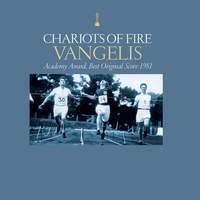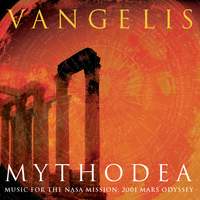Obituary,
Vangelis (1943-2022)
 The musician and composer Evángelos Odysséas Papathanassíou – known to the world as Vangelis – has died at the age of 79. With his musical style shaped by a long and varied career ranging from pop to prog rock, electronic to ambient and classical, his most popular works undeniably remain his successful and distinctive soundtracks.
The musician and composer Evángelos Odysséas Papathanassíou – known to the world as Vangelis – has died at the age of 79. With his musical style shaped by a long and varied career ranging from pop to prog rock, electronic to ambient and classical, his most popular works undeniably remain his successful and distinctive soundtracks.
Born in Thessaly, Greece, the young Vangelis seems to have been a kindred spirit of John Cage – experimenting with the family piano by placing objects such as nails and pans inside it in order to produce new sounds. Initially uninterested in acquiring a formal grounding in music (using his gift for memorising pieces to mask his inability, at the time, to read music), he later formed a rock band with a group of friends. Though only modestly successful in its own right, this experience provided him with a gateway into studio work, and during the ‘60s and ‘70s he divided his time between composing soundtracks and performing.
The prog rock band Aphrodite’s Child brought Vangelis his first significant commercial success, inspiring him to strike out as a solo artist. His debut, Fais que ton rêve soit plus long que la nuit, was outspokenly political in tone, drawing heavily on the 1968 French student riots for its subject matter. Prog rock continued to be an important element of his life, however, with Vangelis narrowly missing out on the opportunity to replace keyboardist Rick Wakeman in the band Yes in 1974. His friendship with Yes’s lead singer Jon Anderson would continue to flourish regardless, and the two released a number of albums together.
By the mid-1970s, Vangelis had set himself up in London with a recording studio and a record deal, and his career as an electronic solo musician began to gather pace. Successful concerts and album releases bolstered one another, and the use of a movement from 1975’s Heaven and Hell as the theme music to Carl Sagan’s groundbreaking and inspirational popular-science series Cosmos: A Personal Voyage in 1980 helped to bring Vangelis’s music to a wider audience.
Despite his myriad musical activities over the course of six decades, it is an unavoidable fact that to many people Vangelis means one of two things: Chariots of Fire or Blade Runner. Both films propelled him into the public arena to an unprecedented extent, with the title track from the former entering that select pantheon of pieces that have become essentially synonymous with a certain emotion or aesthetic. Just as 1986’s Platoon would turn Barber’s Adagio for Strings into a byword for wartime grief and loss, Vangelis’s title track for the 1981 Chariots of Fire, used at the film’s climax, is so indelibly associated with slow-motion sequences that it has like the Adagio since become a subject of widespread parody – proof positive of its success and impact.
While Vangelis’s signature synthesiser-heavy sound might have seemed anachronistic in a film set at the 1924 Olympics, it fits the oppressive, sci-fi noir atmosphere of Ridley Scott’s 1982 masterpiece Blade Runner – set in the then near-future year of 2019 – like a glove. The impact of several moments in the film – its evocative opening, melding dystopia and melancholy, and the memorable “tears in rain” soliloquy towards the end – rely critically on Vangelis’s work, and it is no exaggeration to say that Blade Runner’s cult status itself owes much to the atmosphere created by its soundtrack.
In the ensuing decades, solo albums continued to pour forth, alongside further soundtracks including 1992’s 1492: Conquest of Paradise, with its foreboding title track setting the stage for an often dark reimagining of the portentous first encounter of Europeans and Americans in the Bahamas. Stage music, too, entered the mix, with Vangelis writing the music for adaptations of Euripides’s Medea and Elektra and Shakespeare’s The Tempest, among others. The natural and scientific arenas also continued to be an abiding interest, manifested in albums based on microscopic ecosystems (Soil Festivities, 1984) and subatomic particles (Invisible Connections, 1985), and in a collaboration with French marine documentary-maker Jacques Cousteau, several of whose films Vangelis would score.
On a similar scientific note came collaborations in the 2000s with space agencies – composing pieces connected with NASA’s 2001 Mars Odyssey orbiter mission and ESA’s 2014 Rosetta-Philae probe. Following the death of the English cosmologist Stephen Hawking in 2016, Vangelis composed a score in his memory, part of which was transmitted in the direction of a distant black hole in recognition of Hawking’s long study of the phenomenon. His final album, Juno to Jupiter from late 2021, was likewise inspired by humanity’s study of space – in this case NASA’s Juno mission to the Jovian system, launched a decade previously and still in operation today.
Vangelis’s private life is to a great extent shrouded in mystery; eschewing the heady lifestyle and egocentrism that success could have brought him, he remained modest and approachable, retaining his interests in science and space exploration, and also cultivating his gifts as a painter, which were exhibited in Spain and South America in the early 2000s. For someone so strongly associated with the sound of the synthesiser, he was surprisingly ambivalent about the use of modern technology in music-making – frequently dissatisfied with the capabilities of synthesisers (prompting him to build his own in the mid-2010s) and wary of the impact of computers on the arts.
It is perhaps a cliché to refer to a composer’s style as being at once instantly recognisable yet impossible to define. Nevertheless, Vangelis epitomises this paradox, drawing on a rich selection of musical resources both to conjure up vivid sound-worlds on screen and to express his own outlook on the innate human desire to explore and look outward. Appropriately, then, his legacy extends far beyond the soundtracks that made him a household name and the planet on which they are enjoyed, and includes the naming of a minor planet in his honour (6354 Vangelis, seven and a half kilometres long and located in the asteroid belt between Mars and Jupiter), as well as a transmission of his music into space that is set to arrive at its distant destination in the year 5475.
Vangelis - a selected discography
Vangelis (keyboards/programming), Ambrosian Singers, John McCarthy
Available Formats: MP3, FLAC
Vangelis (keyboards), Kathleen Battle (soprano), Jessye Norman (sopranos), London Metropolitan Orchestra, Choir of the National Opera of Greece, Palamidi and Percussion Ensemble, Blake Neely
Available Formats: MP3, FLAC
Vangelis (synthesiser)
Available Formats: MP3, FLAC
Vangelis (piano), Angela Gheorghiu (soprano)
Available Formats: MP3, FLAC, Hi-Res FLAC






